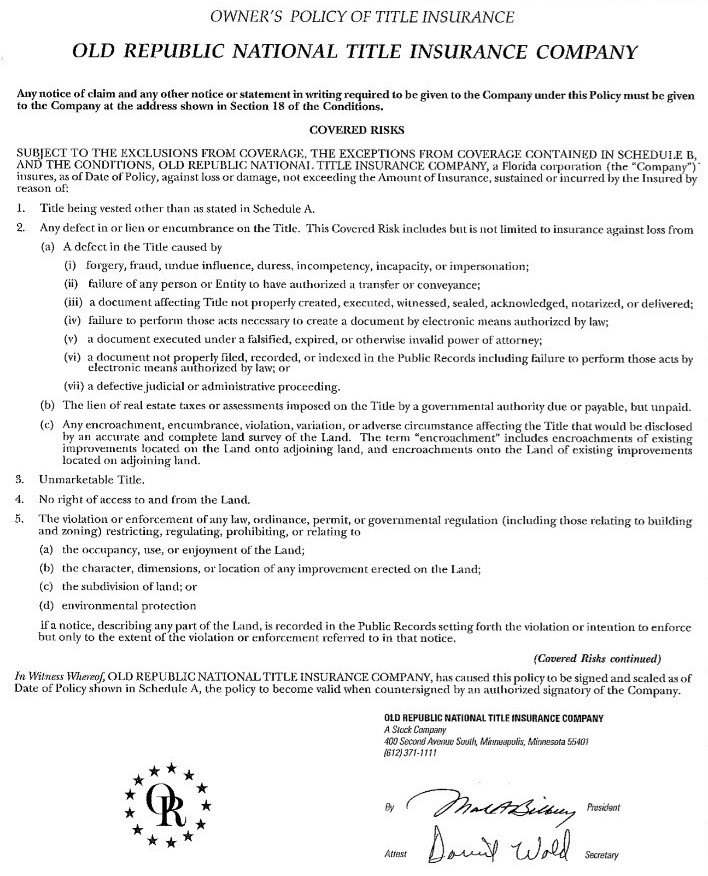The Title Company's Responsibilities
Title companies play a key role in common real estate transactions. Title companies generally act as the combined agent of the insurance company, the buyer, the seller, and any other parties related to a real estate transaction such as mortgage lenders. The title company reviews title, issues insurance policies, facilitates closings, and files and records paperwork.
 Title Review
Title Review
Title companies have sophisticated real estate title search and review departments. These departments review the public records relating to real estate in order to inform all involved parties of the status and condition of title to the subject property. Title companies generally provide this information to each of the parties in the form of a preliminary title report called the title commitment. Title companies also provide title research information related to foreclosures and other types of legal action involving real property.
Closing Agent
 Title companies are often the closing agents for real estate transactions. This means the title company is an agent of each party to the transaction. In its role as an agent, the title company obtains signatures on all of the closing documents and the title company also receives and distributes payments related to the conveyance of the property. After the parties have signed all the documents, the title company will record documents that need to be recorded, such as deeds and mortgages in the local county public records office.
Title companies are often the closing agents for real estate transactions. This means the title company is an agent of each party to the transaction. In its role as an agent, the title company obtains signatures on all of the closing documents and the title company also receives and distributes payments related to the conveyance of the property. After the parties have signed all the documents, the title company will record documents that need to be recorded, such as deeds and mortgages in the local county public records office.
Escrow Officer
Title companies also commonly act as escrow officers in connection with real estate transactions. An escrow officer holds documents or money in trust, as part of the transaction and according to the instructions of the parties. For example, the purchaser of real estate will give the title company the money necessary to pay the purchase price while the seller will give the title company a signed deed to the property. The title company, acting as escrow officer only releases the deed and the money according to the written instructions of the buyer and seller.
Insurance Issuer (Underwriter)
Title company underwriters issue policies of title insurance on behalf of title insurance companies. In most cases, the title company that issues the policy is not actually the insurance company. Instead the title company acts as an independent agent of the insurance company and simply receives a commission for issuing the title policy. The actual premium goes to the insurance company (underwriter) which bears the risk of any loss under the policy. Title companies merely facilitate the paperwork for issuing the insurance policy.
Details regarding the Title Insurance
The purchase of real estate is without doubt one of the biggest decisions you will ever make. Before the property will be conveyed to you as the new owner you want piece of mind that no third party ever can claim any interest in it.

The investigation that your rights and interest in the property are secured is the task of the title company. The payment of the title insurance premium (will usually be paid by the seller, but can be negotiated otherwise) provides you with a continuous insurance protection in the amount of the purchase price.
The process of the so called title search includes a detailled inquiry in all relevant public archives and checks documents to determine whether anybody else than you has a right or interest in the property. By means of this search the insurance company normally can uncover potential problems with regards to ownership and fix them before the closing.
Your title insurance names the property and includes all recorded restrictions of your ownership. Further it states the responsibilities of the insurance company in case it comes to a claim by a third party. Typically your title insurance will protect you from:
-
any claim or dispute of ownership by a third party in front of a court (the insurance company will defend your ownership without you having to pay any court or other fees)
-
any title defect which can not be eliminated (the insurance company will protect you from financial losses up to the amount stated in the title policy)





